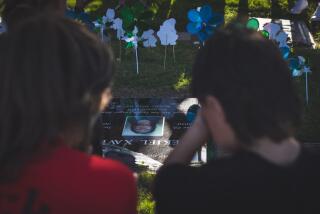Another young pastor advocating for mental health dies by suicide
- Share via
On Monday afternoon, Jarrid Wilson, a pastor at a Riverside megachurch and the founder of a mental health advocacy group, took to Twitter.
“Loving Jesus doesn’t always cure suicidal thoughts,” Wilson wrote. “Loving Jesus doesn’t always cure depression. Loving Jesus doesn’t always cure PTSD. Loving Jesus doesn’t always cure anxiety. But that doesn’t mean Jesus doesn’t offer us companionship and comfort. He ALWAYS does that.”
That night, Wilson, 30, killed himself, according to Harvest Christian Fellowship, where he was an associate pastor.
“He was vibrant, positive, and was always serving and helping others,” Greg Laurie, the church’s founder, wrote in a statement. “Jarrid also repeatedly dealt with depression and was very open about his ongoing struggles. He wanted to especially help those who were dealing with suicidal thoughts. Tragically, Jarrid took his own life.”
Wilson’s passing on Monday followed the death of Andrew Stoecklein, the 30-year-old lead pastor of the Chino megachurch Inland Hills Church, who died by suicide last August, a few days after preaching a sermon about his own struggles with mental illness. Both men left behind a wife and young sons.
After Stoecklein’s death last year, Wilson tweeted: “So sad to hear about the passing of pastor @Andrew_Steck from @InlandHills! My heart goes out to the staff, church, and Andrew’s family.”
A few years earlier, Stoecklein had tweeted a quote by Wilson: “A true leader is not measured by how many times they’ve succeeded, but failed and decided [to] get back up again.”
The young pastors’ deaths have shaken evangelical Christian leaders, said Ed Stetzer, executive director of the Billy Graham Center at Wheaton College in Illinois, who had spoken many times with Wilson about mental health advocacy. Many pastors, he said, hide their own mental illness because they fear their congregations won’t listen to someone who is struggling.
“Pastors are supposed to provide help, not need help. Pastors are supposed to speak of life, not despair. But that’s not reality,” Stetzer said.
Wilson and Stoecklein were widely respected for their candor, which made their deaths all the more devastating, said Stetzer. Too many Christians, he said, believe that mental illness can be cured by prayer and Bible study alone. Depression, he said, is a disease, not the product of inadequate faith.
“Sermons break stigmas, and we need not less but more conversations about this,” Stetzer said.
As part of our Column One story on Kevin Howard’s struggle to build a life beyond the battlefield, here is a list of organizations that provide support, information and resources to veterans and others.
Suicide is a growing public health crisis and the second leading cause of death for people ages 10 to 34, according to the Centers for Disease Control and Prevention. In 2017, more than 47,000 people died by suicide — a rate of about one every 11 minutes.
Wilson died on the eve of World Suicide Prevention Day, and he had been tweeting on Monday about the occasion. Hope, he wrote, is for everyone, and “you don’t have to keep living in the darkness.”
That morning, he also tweeted that he was officiating a funeral “for a Jesus-loving woman who took her own life today. Your prayers are greatly appreciated for the family.”
Kay Warren — who, along with her husband, megachurch pastor Rick Warren of Saddleback Church, lost their son to suicide — responded to that tweet saying she was grateful for Wilson’s “willingness to be the arms of Jesus” to the woman’s family.
Wilson, of Corona, had been an associate pastor at Harvest Christian Fellowship for 18 months. In an interview with Faithwire, Wilson said that sermons by Laurie at Harvest Crusade — a massive, annual evangelical event at Angel Stadium — had led him to become a Christian.
“I was sitting in my car, as I’ve shared many times before, Googling painless ways to commit suicide, and this flood of emotions and wisdom and guidance and God’s presence just began to infiltrate my life,” Wilson told Faithwire. “And I started remembering the things I’d heard from the crusades and the passages of Scripture I had memorized, the Bible studies I had been to, devotionals I had read and the conversations I had with my family.”
In 2016, Wilson and his wife, Juli, founded Anthem of Hope, a faith-based nonprofit organization that runs a chat line for people struggling with psychological distress and is “dedicated to amplifying hope for those battling brokenness, depression, anxiety, self-harm, addiction and suicide.”
In a blog post last year, Wilson acknowledged he had “contemplated suicide on multiple occasions” and challenged the commonly held belief that suicide leads to hell.
“The reality is, you wouldn’t dare say that someone who died of cancer is going to hell just because of their illness would you? I hope not,” he wrote. “Then please don’t assume someone who died of suicide via severe depression is going to hell either. Both are illnesses. Both can lead to death.”
Wilson is survived by his wife and sons Finch, 4, and Denham, 2.
On Monday, Wilson posted a photo of Finch, a smiling, blond-haired boy holding a thumbs up and wearing a red baseball glove and a T-shirt reading, “You’re killin’ me smalls!” — a quote from the the 1993 movie “The Sandlot.” Finch, he wrote, had started playing baseball the week before.
“I’m so proud of this little guy, and I’m honored to be his dad,” Wilson wrote.
The next day, Juli posted an Instagram video of Wilson tossing and catching his son, who squeals with laughter and says, “Again, again!”
“Can’t sleep, so I’m watching this video over and over again,” Juli wrote. “I took this on Monday evening around 7:30 pm at our son’s baseball practice. By 11:45 that night, my sweet husband was in the presence of Jesus.
“I love you, Jarrid. I miss you beyond what my heart can stand.”
More to Read
Sign up for Essential California
The most important California stories and recommendations in your inbox every morning.
You may occasionally receive promotional content from the Los Angeles Times.















